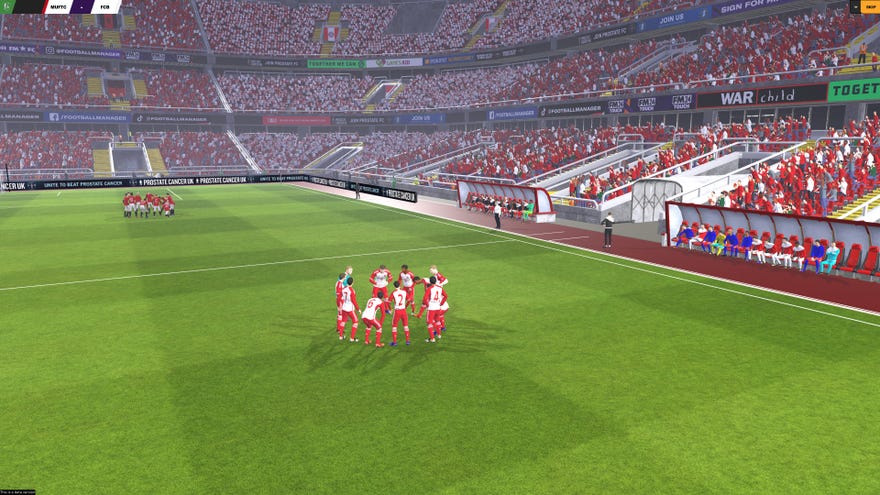Football Manager 2024 review: One last iteration of the most comprehensive management sim going
Season Finale
Like when Sir Alex Ferguson oversaw his final game at Old Trafford, there’s a complicated atmosphere surrounding this year’s Football Manager. Football Manager 2024 is the last iterative game in the series before Project Dragonfly arrives next year, through which Sports Interactive plan the most radical overhaul of the game since the introduction of the 3D match engine in FM 09. This includes a complete rebuild of Football Manager in Unity, implementing brand new animation technology, and the inclusion of women’s football. But there is a reason why the studio has stuck with this tried and tested formula for so long. Big changes come with big risks, and as any Man Utd fan will know, those changes don’t always pay off.
But such concerns are for the future. FM24 is with us right now, and while it may be swapping the dugout for the stands ninety minutes from now, this isn’t some ceremonial exhibition match. It’s business as usual, and in mostly good ways. Sports Interactive have made meaningful changes to the management game both on and off the pitch, all built on top of fundamentals that remain as complex and compulsive as they have for years. That said, FM24 also demonstrates why a change is welcome, as in its current form it can struggle to strike the balance between authenticity and fun.
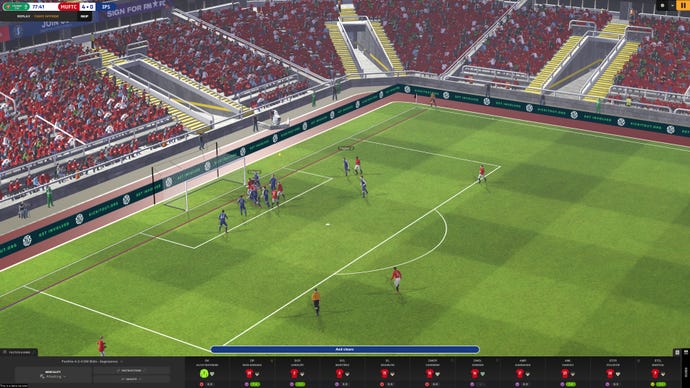
One of the focal points of this year’s update is the match engine, which is surprising given what’s happening next year. Nonetheless, Sports Interactive have made several adjustments to how they simulate on-pitch action. At the heart of this is a new “motion-matching” system that can pull animations from the game’s database and deploy them with better context. Transitions, like a player shifting from receiving a ball to sprinting, are noticeably smoother than before. It also lends greater personality to off-the-ball action, like players half-heartedly raising their hands to claim corners they obviously didn’t win.
Running alongside this is an updated ball-physics system that better models effects like friction with the ground, spin, and shot-deflection. The latter is by far the most noticeable of these. Attack phases are frequently influenced by deflections, to the point where it can result in freak goals when the box is packed with bodies for set plays like corners and free kicks.
In terms of representing how football moves, I’d say FM24 is about 85% of the way there. There are still areas where it is noticeably unrealistic, the primary example being tackles. On-foot interceptions are often realistically depicted, but when two players collide it all turns a bit Action Man. Other weakspots show themselves when play suddenly shifts direction and everyone has to about-face, alongside more isolated incidents of players visibly shifting animation, or gliding across the ground slightly to reach a designated spot.
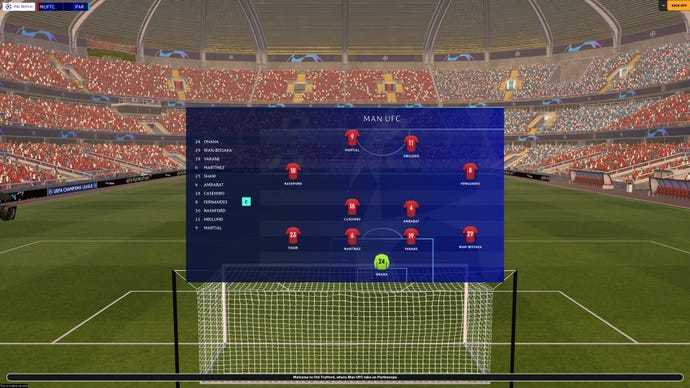
Alongside these core updates to the match engine, FM24 also offers a more general graphics upgrade, and more specific changes to how players can move. Regarding the former, new features include significantly improved lighting and sharper pitch textures. This provides a much clearer contrast between lit and shadowed areas, both during the daytime, when tall stands block the sunlight to cast looming shadows at the fringes of the pitch, and at night, when the floodlights create those eerie four-way shadows beneath players. All of this is pretty basic by modern standards, and in terms of visual fidelity FM24 still looks 15 years out of date. But it certainly looks good enough, and more importantly, moves great.
As for those smaller changes, FM24 brings a tentative introduction of positional play, where certain players like Advanced Playmakers will move into new positions when you’re in possession, opening up new passing opportunities to move the ball forward more smoothly. Tying into this is the introduction of Inverted Full Backs, who move forward while your team is in possession to play a more central defensive role. It’s a fairly limited implementation, only really affecting certain positions in higher-tier clubs. But it’s a welcome addition regardless.
All of this results in highly watchable match simulations that better reflect both the technical and human qualities of football. There’s still plenty Sports Interactive can improve upon, from the basic character models and crowd simulation, to minor details like more elaborate manager animations at the end of the match (I’ve grown weary of seeing my manager raise his arms above his head like a tickled Slow Loris when he wins.) But it’s elaborate enough that you can enjoy not just major events like spectacular goals, but little moment-to-moment details, like a winger slipping past a defender on the half-turn.
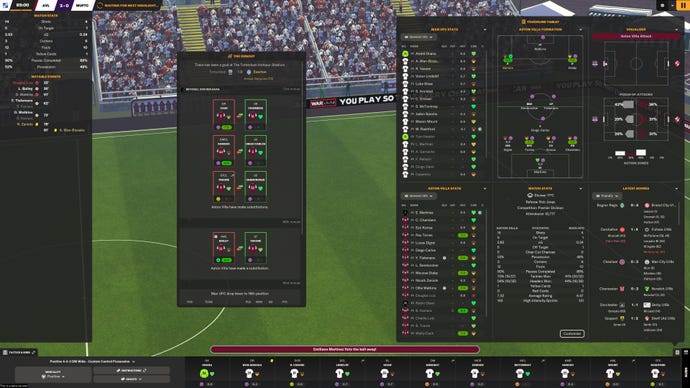
There are new features off-pitch too. But before we slide-tackle into those, I should point out the introduction of two important quality of life features. The first is the ability to transfer your save file from FM23 to FM24. It’s a bit daft that this is only happening now, just as the series is about to undergo a major overhaul, rather than in all those years of iterative continuation. But it is finally happening. The other is the ability to start your career in three different ways. "Original" starts the game in preseason 2023 with all players at the appropriate clubs. "Real World" starts your career on the current real-life date, with all players at their respective clubs. Finally, "Your World" sets squads and budgets at the date your game starts, with all future transfers cancelled.
As for those off-pitch features, by far the most significant is the set-piece creator, designed to reduce micromanagement of free kicks, corners, and throw-ins. Rather than setting every parameter yourself, the set-piece creator asks you a range of questions about your preferences regarding balls kicked from static positions, such as whether you want marking to be zonal or player-based, whether you want corners to be inswinging or outswinging, and so forth.
Once you’ve answered those questions, the newly introduced set-piece coaches build a range of corner and free-kick routines, then assign players to those routines. Players are assigned by attributes (such as Aerial Threat and Recovery Defender) rather than position. Crucially. players are ranked by these attributes automatically, meaning if a player is substituted or injured, then the player with the next-best attributes will take their place in the set-piece. The result is a much more intuitive system that still lets you get creative if you choose, allowing you to build new routines, and even specify how often you want different routines to be used.
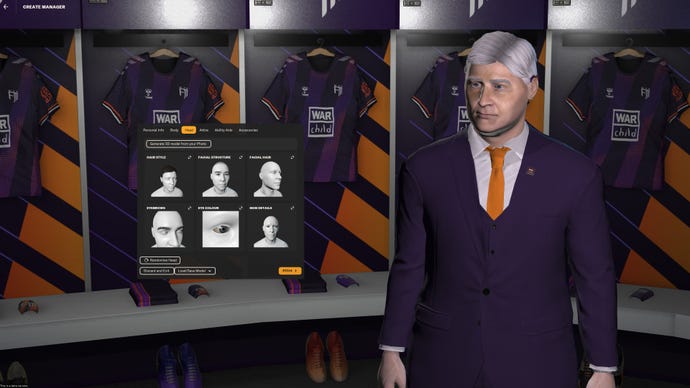
The set-piece creator is a great addition. I’m less enthused by the alterations FM24 makes to the transfer market. FM24 adds two new features here, although it’d be more accurate to describe them as collections of features. The first is greater options for selling players, which includes asking agents for assistance by gauging the market interest in specific players, alongside the ability to hire Intermediaries to help secure the move. The other is more robust manager AI, which improves their ability to spot holes in their squad, and increases their tenacity in the transfer market.
All of this is designed to better-reflect the reality of modern football, and perhaps it does. But it also makes transfers more of a headache than they already were. Adding an intermediary might help you sell a player, but it also further drags the process out. The fun of signing a new player is signing a new player, everything that gets in between that makes it less exciting. Which isn’t to say I should be allowed to sign Erling Haaland for five quid and a bag of chips, but that FM can sometimes be overly concerned with the reality of football management in favour of providing an entertaining experience for the player.
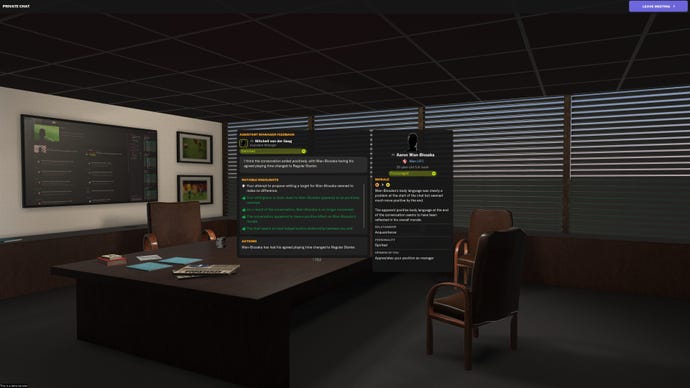
This is an issue in other areas too. Yes, having simulated press conferences and matchday interviews makes the experience more authentic, but they very quickly become a chore to interact with. Likewise, weekly staff meetings always involve you clicking “Do it” on various minor points and being mithered about hiring staff the board will just block, rather than offering meaningful decisions for you to make. You can skip these parts of the game by using assistants or asking for summaries. But that doesn’t really solve the problem that these elements are not much fun to start with. Indeed, the game often overrelies on managerial suggestions for optimal decisions, rather than structuring its UI and datasets in such a way to make player decision-making more intuitive.
It is, of course, incredibly tough to get the balance right in these things, and given just how complex Football Manager is now, FM24 does an impressive job of clarifying its many facets overall. This is, as it always has been, a very good management sim, one that offers huge rewards provided you’re willing to brave those initial ten hours feeling overwhelmed by it. I’m looking forward to seeing just what Sports Interactive have in mind for Project Dragonfly, but for now, let’s give a big hand to Football Manager 09-24. It may be obsessive and uncompromising, but it’s also the best to ever do it.
This review was based on a review build of the game provided by developers Sports Interactive.
